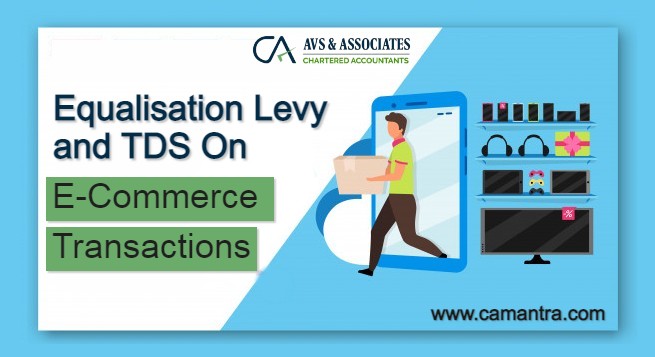Finance Act, 2016- Equalisation Levy- CHAPTER VIII- Section 163 to 172 deals with Equalisation levy definition, interest, penalty, filing of the annual statement, the penalty for failure to furnish statements.
Equalisation Levy
Considering the potential of new digital economy and the rapidly evolving nature of business operations and to address these challenges, the Finance Act 2016 has inserted a section, called section 165, to provide for an equalisation levy of 6 % of the amount of consideration for specified services received or receivable by a non-resident not having PE (permanent establishment ) in India, from a resident in India who carries out business or profession, or from a non-resident having permanent establishment in India, if such consideration exceeds INR 1 lac P.A.
Enhancement in the Scope of Equalisation Levy by the Finance Act 2020
The Finance Act 2020 has now introduced a new provision named as section 165A in the Finance Act, 2016, to increase the scope of the Equalisation Levy. Equalisation Levy will now be extended to an e-commerce operator on ‘e-commerce supply and services’ undertaken on or after 01.04.2020.
An e-commerce operator- a non- resident, who owns/operates or manages digital facility or platform for sale of goods through online or online provision of services or both.
How “E-commerce supply and services” has been defined:
(i) Online provision of sale of goods/ services provided owned/provided by the e-commerce operator
(ii) Online sale of goods or provision of services or both, provided by the e-commerce operator
(iii) Any combination of the above activities.
This Equalisation Levy shall be levied @ 2% on the amount of consideration towards e-commerce supply and services made or provided or facilitated by an e-commerce operator to:
(i) A person resident in India;
(ii) A non-resident in the following specified circumstances:-
(a) Sale of advertisement whose targeted customer are those who are resident in India or a customer who accesses the advertisement via IP address located in India.
(b) Sale of data which is collected from a person who is resident in India or uses IP address located in India.
(iii) To a person who purchases such goods or services or both using IP address located in India.
Insertion of section 194-O for Levy of TDS at the rate of 1% on e-Commerce Transactions
Finance Act 2020 has introduced a new section 194-O to widen and deepen the tax net by bringing participants of e-commerce within tax net, section 194-O to provide for a new levy of TDS @ 1% with the following key points:
- The TDS is to be paid by e-commerce operator for sale of goods or provision of service facilitated by it through its digital platform;
- E-commerce operator is needed to tax deduction at the time of credit of amount of sale or service or both to the e-commerce participant’s account or at the time of payment thereof to such participant through any mode, whichever is earlier.
- The tax at 1% is needed to be deducted on the gross amount of such sales or service or both.
- The sum credited or paid to an e-commerce participant (being an individual or HUF) by the e-commerce operator will not be subjected to provision of this section, if the gross amount of sales or services / both of such individual/ HUF, through e-commerce operator, during the previous year does not exceed INR 5 lacs and such e-commerce participant has furnished his/her PAN or Aadhaar number to the e-commerce operator.
- A transaction in respect of which tax has been deducted by the e-commerce operator under this section or which is not liable to deduction under the exemption discussed in the previous bullet, under any other regulation of Chapter XVII-B of the Act there will not be further liability. This is to provide clarification so that same transaction is not subjected to TDS more than once. This exemption wills not applicable to any amount received or receivable by an e-commerce operator for hosting advertisements or providing any other services which are not connected with the sale of services or goods referred to in sub-section (1) of the proposed section.
- As defined in section 194J, “services” is defined to include fees for technical services and fees for professional services, as defined in section 194J.
- Important amendments are being introduced in section 206AA (which is to provide for tax deduction at 5 % in non PAN card / Aadhaar card cases) ), in section 204 (which is to define person responsible for paying any sum) and Section 197 (which is for lower TDS.
This amendment has effected from 1st April, 2020. Well-known e-commerce platforms like Amazon India and Flipkart are required to deduct income-tax (TDS) @ 1% of the gross amount paid to the seller using the platform for sales, starting 1 October.
A separate provision also asks every seller with more than INR 10 crore sales in the year before, to collect 0.1% of the sale consideration above INR 50 lacs as income tax (TCS) at the time of payment receiving.
The above discussed newly inserted legislative provisions viz. expansion in the scope of equalisation levy on digital e-commerce supply of goods and services by non-resident e-commerce operators at the rate of 2% under section 165A and the levy of TDS at the rate of 1%, on e-commerce transactions, under the Income Tax Act- section 194-O, clearly amplifies the Indian Government’s firm determination and swift inclination towards the introduction of ‘Source Rule’ based Digital Tax, on the big non-resident e-commerce players, having no physical presence in India, but gaining adequate revenue in India, by their digital e-commerce platforms.

